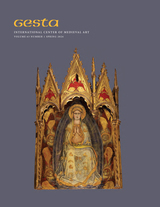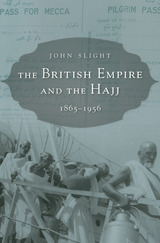
The British Empire at its height governed more than half the world’s Muslims. It was a political imperative for the Empire to present itself to Muslims as a friend and protector, to take seriously what one scholar called its role as “the greatest Mohamedan power in the world.” Few tasks were more important than engagement with the pilgrimage to Mecca.
Every year, tens of thousands of Muslims set out for Mecca from imperial territories throughout Africa, the Middle East, and Asia, from the Atlantic Ocean to the South China Sea. Men and women representing all economic classes and scores of ethnic and linguistic groups made extraordinary journeys across waterways, deserts, and savannahs, creating huge challenges for officials charged with the administration of these pilgrims. They had to balance the religious obligation to travel against the desire to control the pilgrims’ movements, and they became responsible for the care of those who ran out of money. John Slight traces the Empire’s complex interactions with the Hajj from the 1860s, when an outbreak of cholera led Britain to engage reluctantly in medical regulation of pilgrims, to the Suez Crisis of 1956. The story draws on a varied cast of characters—Richard Burton, Thomas Cook, the Begums of Bhopal, Lawrence of Arabia, and frontline imperial officials, many of them Muslim—and gives voice throughout to the pilgrims themselves.
The British Empire and the Hajj is a crucial resource for understanding how this episode in imperial history was experienced by rulers and ruled alike.
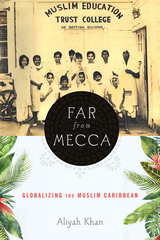
Far from Mecca: Globalizing the Muslim Caribbean is the first academic work on Muslims in the English-speaking Caribbean. Khan focuses on the fiction, poetry, and music of Islam in Guyana, Trinidad, and Jamaica. Combining archival research, ethnography, and literary analysis, Khan argues for a historical continuity of Afro- and Indo-Muslim presence and cultural production in the Caribbean. Case studies explored range from Arabic-language autobiographical and religious texts written by enslaved Sufi West Africans in nineteenth-century Jamaica, to early twentieth-century fictions of post-indenture South Asian Muslim indigeneity and El Dorado, to the attempted government coup in 1990 by the Jamaat al-Muslimeen in Trinidad, as well as the island’s calypso music, to contemporary judicial cases concerning Caribbean Muslims and global terrorism. Khan argues that the Caribbean Muslim subject, the “fullaman,” a performative identity that relies on gendering and racializing Islam, troubles discourses of creolization that are fundamental to postcolonial nationalisms in the Caribbean.

The Hajj, one of the five pillars of Islam, is the largest pilgrimage in the world today and a sacred duty for all Muslims. Each year, millions of the faithful from around the world make the pilgrimage to Makkah, the birthplace of Islam where the Prophet Muhammad received his revelation.
With contributions from renowned experts Muhammad Abdel Haleem, Hugh Kennedy, Robert Irwin, and Ziauddin Sardar, this fascinating book pulls together many strands of Hajj, its rituals, history, and modern manifestations. Travel was once a hazardous gamble, yet devoted Muslims undertook the journey to Makkah, documenting their experiences in manuscripts, wall paintings, and early photographs, many of which are presented here. Through a wealth of illustrations including pilgrims' personal objects, souvenirs, and maps, Hajj provides a glimpse into this important holy rite for Muslim readers already grounded in the tradition and non-Muslims who cannot otherwise participate.
Hajj does not, however, merely trace pilgrimages of the past. The Hajj is a living tradition, influenced by new conveniences and obstacles. Graffiti, consumerism, and state lotteries all now play a role in this time-honored practice. This book opens out onto the full sweep of the Hajj: a sacred path walked by early Islamic devotees and pre-Islamic Arabians; a sumptuous site of worship under the care of sultans; and an expression of faith in the modern world.

Integrating Islamic examples into the comparative study of religion, Brannon Wheeler shows how the treatment of rituals, relics, and territory is related to the more general mythological depiction of the origins of Islamic civilization. Along the way, Wheeler considers the contrast between Mecca and Eden in Muslim rituals, the dispersal and collection of relics of the prophet Muhammad, their relationship to the sanctuary at Mecca, and long tombs associated with the gigantic size of certain prophets mentioned in the Quran.
Mecca and Eden succeeds, as few books have done, in making Islamic sources available to the broader study of religion.
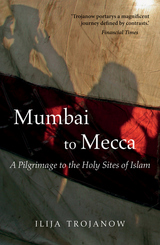
This book presents Ilija Trojanow’s journey from Mumbai to Mecca in the tradition of the rihla, one of the oldest genres of classical Arabic literature, describing the Hajj, the pilgrimage to the holy sites of Islam. Every Muslim, regardless of geographical location, is implored by tradition to undertake the Hajj at least once in their life if they are able. Trojanow, with the help of his friends, donned the ihram, the traditional garb of the pilgrim, and joined the hundreds of thousands of Muslims who each year go on the Hajj. Over the course of a mere three weeks he experienced a tradition dating back over a thousand years. This personal and enlightening account will provide insights not only for Muslims who have yet to embark on the Hajj, but for those who have already made the journey and want to see a different perspective on it. Mumbai to Mecca also presents a unique glimpse into this pivotal tradition for those non-Muslims who remain barred from the most holy Muslim sites.
the pilgrimage to the holy sites of Islam, through the eyes of a Westener, but with the heart of a Muslim.
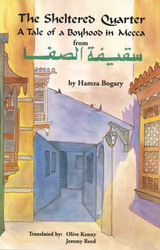
Hamza Bogary describes a bygone way of life that has now irreversibly disappeared. He speaks of life in Mecca before the advent of oil. Only partly autobiographical, the memoir is nevertheless rich in remembered detail based on Bogary's early observations of life in Mecca. He has transformed his knowledge into art through his sense of humor, empathy, and remarkable understanding of human nature. This work not only entertains; it also informs its readers about the Arabia of the first half of the twentieth century in a graphic and fascinating way. The narrator, young Muhaisin, deals with various aspects of Arabian culture, including education, pilgrimages, styles of clothing, slavery, public executions, the status of women, and religion. Muhaisin is frank in his language and vivid in his humor. The reader quickly comes to love the charming and mischievous boy in this universal tale.
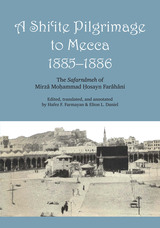
Western accounts of the Hajj, the ritual Muslim pilgrimage to Mecca, are rare, since access to Mecca is forbidden to non-Muslims. In the Muslim world, however, pilgrimage literature is a well-established genre, dating back to the earliest centuries of the Islamic era. A Shiʿite Pilgrimage to Mecca is taken from the original nineteenth-century Persian manuscript of the Safarnâmeh of Mirzâ Moḥammad Ḥosayn Farâhâni, a well-educated, keenly observant, Iranian Shiʿite gentleman.
This memoir holds a wealth of social and economic information about Czarist Russia, the Ottoman Empire, Egypt, Northern Iran, and Arabia. The author is a meticulous observer, recording details of distances, currencies, accommodations, modes of travel, and so on. He records the experiences encountered by pilgrims of his day: physical hardships, disease, generosity and compassion, banditry, hospitality, comradeship, and exaltation. And, without prejudice, he discusses the tensions between the Shiʿites and the Sunnites in the holy places—tensions that still exist and have erupted in bloody clashes during recent pilgrimages.
A Shiʿite Pilgrimage to Mecca will appeal to a wide audience of general readers, Middle Eastern scholars, anthropologists, and historians.
READERS
Browse our collection.
PUBLISHERS
See BiblioVault's publisher services.
STUDENT SERVICES
Files for college accessibility offices.
UChicago Accessibility Resources
home | accessibility | search | about | contact us
BiblioVault ® 2001 - 2024
The University of Chicago Press






